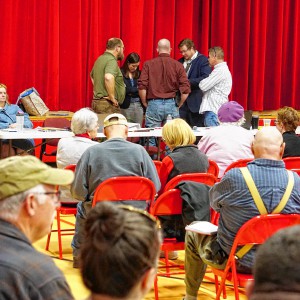Weare police officer discusses his health after shooting
| Published: 08-19-2019 5:45 PM |
For the human side to the story, Monday’s press conference at the Weare Police Department served its purpose.
Officer Paul Lewis, his right arm totally bandaged beginning with his knuckles, was grateful he could celebrate his 28th birthday, seven days after a man who later took his own life fired two bullets into Lewis’s right arm during a domestic violence dispute. There’s a good chance Lewis will make a full recovery and return to what he described as his dream job.
That’s why the media were called. This was an update, a medical report, on a really brave cop.
“I’m doing pretty good right now,” said Lewis, a Boston kid with one year of experience on the force here. “I’m very limited as far as my arm goes. But I still have my other one. Unfortunately, I’m not left-handed, so it’s an adjustment for sure.”
But if you were itching to find out exactly what happened inside that house at 236 Buckley Road, you’ll have to wait, because this is an ongoing investigation, stemming from the incident Aug. 1.
That’s the other part of the story. The part about the gun battle that ensued once Lewis and his partner, Austin Maguire, entered the home. The number of times the shooter, Jeffrey Clough-Garvin, was hit, beyond the self-inflicted gunshot wound to the chest that authorities say ended his life at age 43. Lewis’s role in getting the woman involved in the domestic dispute out of the house unharmed. How the two officers themselves managed to escape such a dangerous scenario.
One thing we learned from earlier reports was that Maguire fired his weapon. I wondered how close Clough-Garvin got to Lewis when he fired at him. Weare police Chief Chris Moore, seated to Lewis’s left, played defense for his officer, shielding him from the kinds of questions that would explain the overall picture.
“We can’t answer that,” Moore told me during the half-hour Q&A with print and TV reporters.
Article continues after...
Yesterday's Most Read Articles
 ‘What the hell is going on?”: Chichester votes to defund entire town administrative office, but may reconsider
‘What the hell is going on?”: Chichester votes to defund entire town administrative office, but may reconsider
 ‘Voting our wallets’: Loudon residents vote overwhelmingly against $1.7M bond for new fire truck
‘Voting our wallets’: Loudon residents vote overwhelmingly against $1.7M bond for new fire truck
 Boys’ hockey: Concord takes championship in historic quadruple overtime victory over BG, 2-1
Boys’ hockey: Concord takes championship in historic quadruple overtime victory over BG, 2-1
 Hopkinton voters call for action on ‘inadequate’ state funding for public education
Hopkinton voters call for action on ‘inadequate’ state funding for public education
So, we’ll wait for answers. Meanwhile, four weeks after the shooting, Lewis walked into the press conference with a pillow, sort of a bed for his injured arm, resting it on a table.
This was a special moment for Lewis, talking about the community support he’s received from colleagues, family, friends, children. The texts, the phone calls, the signed framed photo from students at the Police Academy, the crayon-written cards on construction paper that were obviously made by young hands.
Lewis wanted “the opportunity to thank the community” as he continues his recovery. He said he gets down “when trying to open a water bottle and it won’t open and I got to use my leg, or try to scrub myself in the shower.”
Those details were forthcoming.
Not the rest, though. We know the 911 call came in about 1:30 a.m. Aug. 1, the start of an experience Lewis will not soon forget, a terrifying episode that did not end until the sun had risen.
He underwent a four-hour surgery on his forearm and biceps. Plates and rods were placed in both. He said his arm is “dead weight,” and he’ll need another surgical procedure in two weeks.
That’s when he’ll have a better idea of when he can return to light duty. Six months would be a reasonable estimate, doctors told Lewis, to regain at least most of his mobility.
That’s the physical aspect. The other part, his emotional state and adaptability, is another matter, and Lewis was honest about that. He said he’ll probably seek therapy, and he’s lucky his education dealt with issues that might be connected here.
Lewis has undergraduate and master’s degrees specializing in mental health.
“I know all about mental illness, and right now I have not experienced it and I’m thankful for that,” Lewis said. “You don’t know when it’s going to happen. It can happen anytime.”
Neither cop would speculate on the mental state of Clough-Garvin during the shooting. They wouldn’t touch raw facts either.
For now, Lewis will tell you whatever you want to know about his feelings. He’s an optimist, and that will help during his recovery.
“I’m alive,” he said, “and that’s all I care about.”
]]>







 Henniker ponders what is a ‘need’ and what is a ‘want’
Henniker ponders what is a ‘need’ and what is a ‘want’ Boscawen residents vote to fund major renovation of public works building
Boscawen residents vote to fund major renovation of public works building In Pembroke, Education Freedom Accounts draw debate, voters pass budget
In Pembroke, Education Freedom Accounts draw debate, voters pass budget
